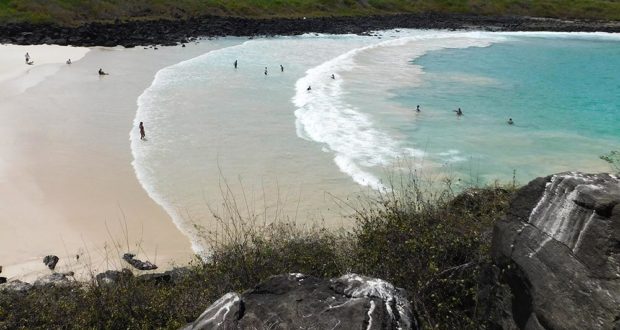While trying to put on my fins with my back to the sea, feet pointing awkwardly out of the water, I was laid out by a rogue wave that sent me tumbling head over heels. My snorkel and mask with prescription lenses were ripped off my head and disappeared into the foam.
After coughing up some of the water I’d inhaled, I looked for them for about 15 minutes before giving up and trudging slowly back toward the beach. They didn’t float, and the current was strong; they could have gone anywhere. And there was no way to replace them. Without them, I was practically blind in the water and would have to change my plans for the rest of the trip.
On my way to shore, a Galapagueno stopped me and asked what was wrong. I must have looked despondent. In broken Spanish, I explained that a wave had carried my mask and snorkel away. I walked up the beach with my fins in hand and sat, staring down at the sand. A few minutes later, looking back out at the waves, I saw a dozen people wading in the surf where there were only two or three before, all of them glancing down at the water. I walked toward them, slowly realizing that they were all looking for my mask. Although I thought it hopeless, I had to join them. About 10 minutes later a teenage boy popped out of the water a distance away, waving my mask and snorkel in the air above him. I almost cried when he swam them over to me and everyone else rushed over to see. I didn’t understand everything they were saying, but they acted as if Ecuador had just won the World Cup.
The next morning I was back in Puerto Baquerizo Moreno, calling a taxi to take me to the university. When I got in, I said as I did every morning, “La universidad, por favor”, and rummaged around in my backpack. Instead of driving off, the driver turned around with a big smile and said, “Do you remember me?” Before I could say anything he said in broken English, “My son found your mask at Puerto Chino.”
In the Galapagos I saw tortoises as big as boulders, lizards that swam in the sea and birds that looked like cartoons, but there is nothing that will stay with me as much as the sight of that crowd of optimistic Galapaguenos scouring the surf for my mask and snorkel.
